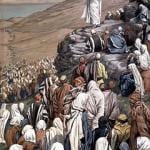We are in fertile ground, and we are discovering that there is plenty of room for ministry and mission.
Greg Garrett: You say in the book that you believe in the role of seminaries, but the failure of some and difficulties faced by others in the Episcopal Church suggests some changes may be in order. What do you think theological education for the ministry needs to look like going forward? How, for example, should the seminaries respond?
Andy Doyle: We have a great seminary in the Diocese of Texas that is looking at new ways and partnerships to meet the formation needs of laity and clergy alike in a changing mission climate. I am a strong supporter of seminaries, the kind of community they provide, and the ministry they offer to the church. I am also proud to be involved in several other seminaries — VTS and Sewanee specifically.
What I know is that seminaries are asking wonderful and difficult questions about the future. I believe to untangle that future we have to commit to residential and online training that is focused on relation building and context immersion. I think we need to free up teaching outside of the seminary campus to intentionally take formation resources out into the congregations. I believe we need to understand that we have been forming clergy for a different time and it is now time to form them for a new age.
Moreover, for the sake of theological education we cannot be an unhealthy diaspora. It is no longer okay to think about theological education without thinking of the advances and current thinking in pedagogical models that are at the forefront of education. Technology, the human sciences, communities, and what we know about how people learn are changing and seminaries, to be helpful to the church's mission, must step into this world with us.
Greg Garrett: We are coming up on General Convention, and this convention will be electing a new presiding bishop and debating some big changes in the structure and perhaps even emphasis of the Church. What wisdom might you pull from the research and writing you've done that you think would be most pertinent for delegates and observers of the process this summer?
Andy Doyle: First, let us not take ourselves too seriously. We must do the hard work of reimagining the revelation of God's church, the ecclesia. We are trying to move toward that vision and we know we are not going to get there! We just aren't, so it won't be the coming of the reign of God and it won't be the end of the world if we pass or don't pass particular things. What we must remember is that we are groaning, as all creation is groaning, toward God's dream of us.
Second, we have a great responsibility to do our best. We must engage fully, prayerfully, and with our whole selves to move our organization into a mission-supporting organism that gets out of the way of creativity and innovation, supports the grass roots work of the Church, and creates or renews structures. We have inherited a system created mostly by men that resembles the very best organization of the 19th century. We must listen carefully to the wisdom and voices of many people inside General Convention, but more importantly outside of General Convention, creating a strong sense of where we are to go and how we are to help our people in congregations do ministry. This is the work. The work is the local transformation of lives. So we must endeavor to make those necessary expansions in difference to help us hear all God's people and we must act upon such wisdom gathered.
Thirdly, "best practices" alone won't get there. Better examples from culture, organizational knowhow, the gifts and talents of the masses of Episcopalians gathered won't get us there. What will is having a vision of what God is inviting us into, which is nothing less than the divine community. We are inheritors, we are the family of Abraham, we are the ones who are to join our God on the last day. So it is that we must grab hold of God's vision of a peaceful community, a safe community, a healthy community, a community where resources are shared, and a community of forgiveness, love, mercy, and kindness. Trying to have this heart vision, articulating this vision, and listening to others as they offer their visions will be what will drive the positive and forward-moving action that our churches need in a mission organization.
Lastly, two quotes: "Do not fear," and "You have been called for just such a time as this." We are invited to venture with Jesus away from the shore. We are invited to leave the safety of our homes and what is comfortable — even what we have worked our whole lives to obtain. We must set out with Jesus into the sea and out into the world.
We have been called for just such a time as this, Mordecai says. You and I have been called for just such a time as this. This is our vision. This is our time. This is our opportunity to write the legacy of the Church of God and how it responded to this era and this context. We should not be afraid and we should pick up our mantel of leadership and step bravely into the future.





